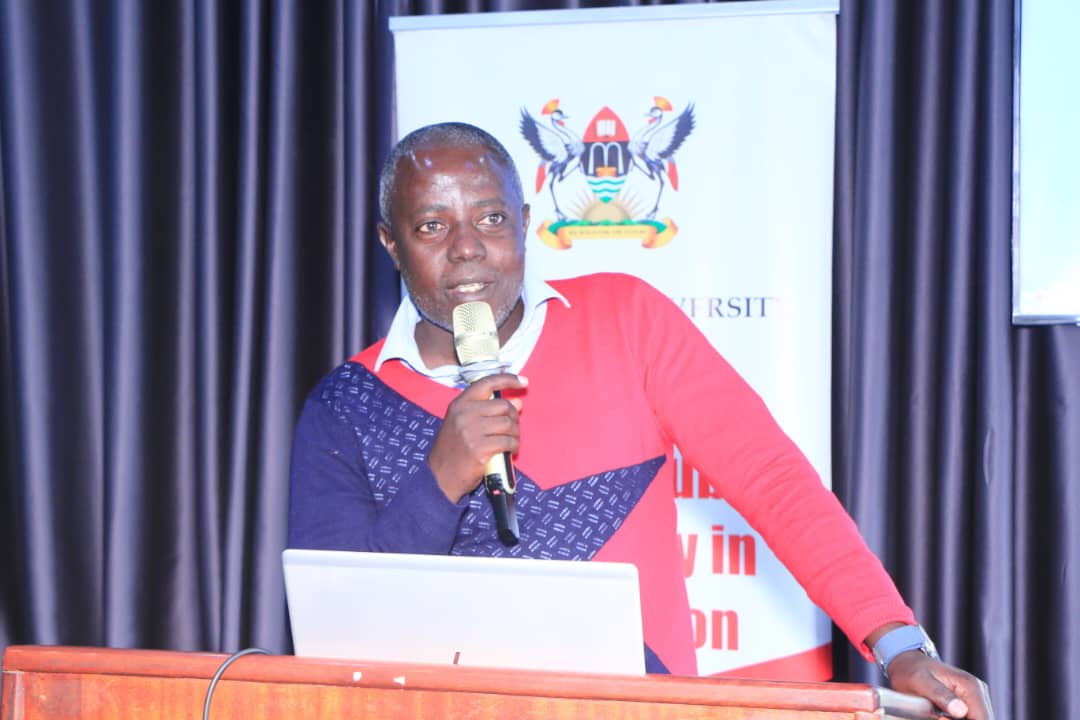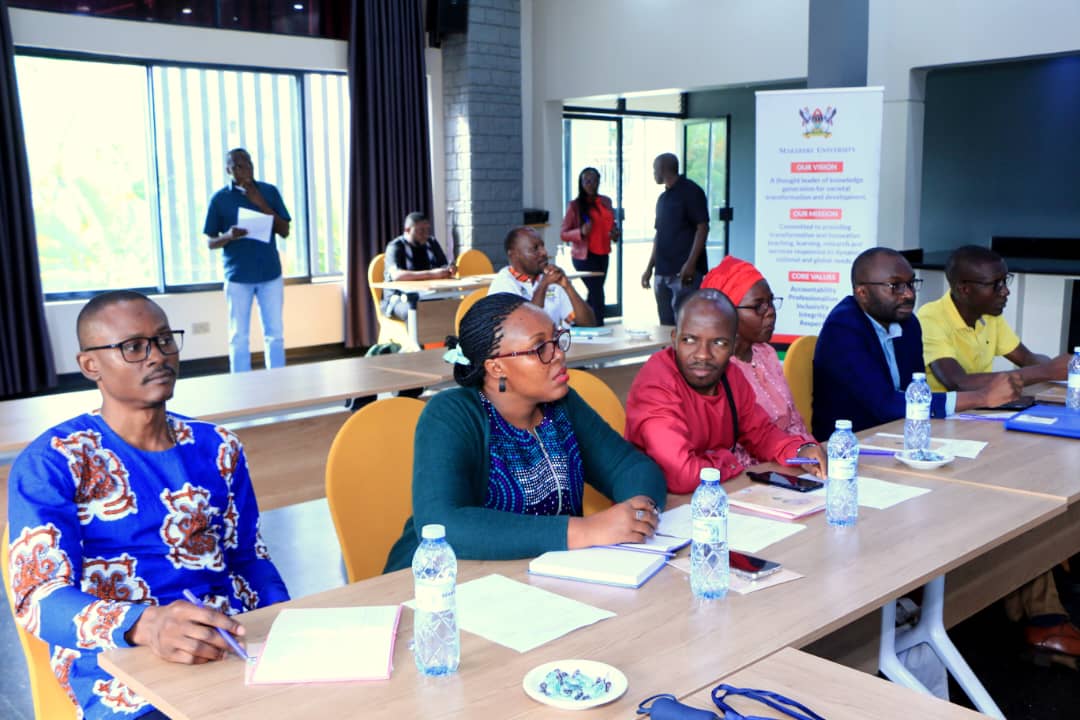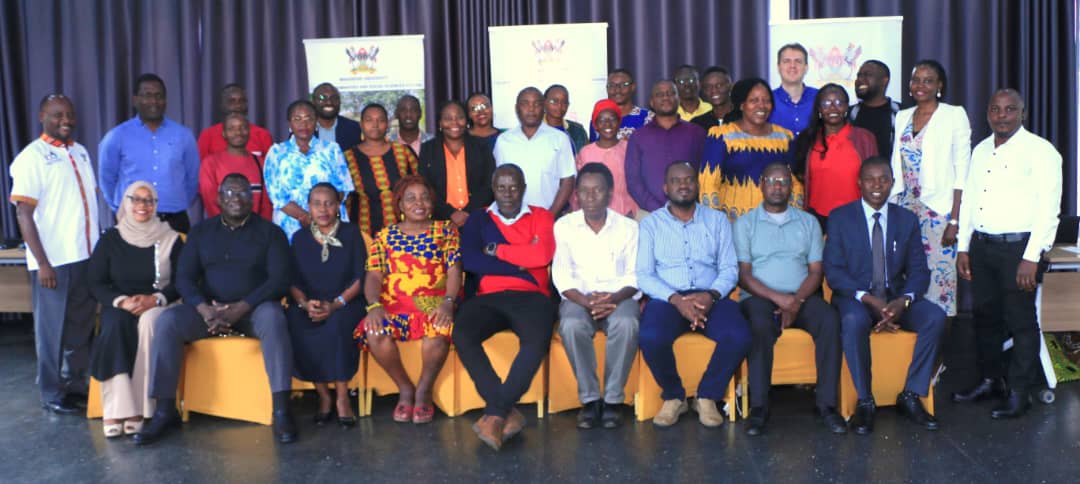
The College of Humanities and Social Sciences (CHUSS) through its Projects Coordination office hosted a pre-field workshop for the 2022 Cohort of PhD students funded by the Gerda Henkel Foundation.
The workshop was part of the activities held by the college to support and guide students on the PhD Funded cohort system to help them complete on time.
The workshop held on 8th December 2023 at Fairway Hotel in Kampala, brought together former and current fellows and senior academic staff to share their expertise and experiences on what cohort 2022 expects as they move to the field to collect data.
In this year, Cohort 2022 has completed one year within which they variously achieved several milestones. The students have registered with Makerere university and thus are bonafied students. They have also defended their proposals at departments and schools and most of them are on course of getting full admission as PhD students in Makerere university.
 In his welcome and opening remarks, the CHUSS Projects Coordinator Dr. Fred Nabutanyi congratulated the 2022 cohort for all purposes and intents they completed in a year.
In his welcome and opening remarks, the CHUSS Projects Coordinator Dr. Fred Nabutanyi congratulated the 2022 cohort for all purposes and intents they completed in a year.
Nabutanyi reminded students that they have certain rights as PhD Students but also certain obligations which go hand in hand including , a right to support as PhD students who are funded.
“There is tuition that is paid. The college with its funders pay your tuition at the start of every year but it is your duty to ensure that you register and secure documentation of your tuition fee”.
He said the college provides stipend by all yardsticks, as a generous stipend which is not enough to solve their financial needs hence the need to recall that it is simply to facilitate their studies predicated on an understanding that, they were living before the PhD and the stipend.
Dr. Nabutanyi cautioned on unrealistic demands on the college and coordination office which is troubling, advising students to try to live within the stipend and other resources they hold.
The other obligation Nabutanyi stressed was that, they are full time students with legal instruments to it. He cautioned students against certain attractive related activities that may come their way. Before they sign or jump on them, Nabutanyi said, they should first remember that they are full time and all efforts should be directed to completing their studies.
Should they be distracted, he advised, they must measure how much time they have in excess to do something else.
 “The practice for Makerere university students has been you treat it as a part time engagement which varies between native and foreign students. Foreign students who have no relatives and cousins who will die tend to treat this academic journey as full time.
“The practice for Makerere university students has been you treat it as a part time engagement which varies between native and foreign students. Foreign students who have no relatives and cousins who will die tend to treat this academic journey as full time.
Ugandans, you have funerals and other things to be done. These are full time studies and they should be treated with utmost priority so that you can complete your studies in the three stipulated years,” Dr. Nabutanyi emphasised
He said the college will endorse applications for grants but it will be incumbent on students to evaluate whether they can manage, and, whether it is within their time planning. If stuck, he said, they should consult the almnac that was shared on where they are supposed to be, and what they are supposed to have achieved by that time.
Dr. Nabutanyi pledged college support with workshops like this, to redirect students, advising them to utilise the cohort system and create that community to support and learn from each other.
Giving the statistics of the project, Nabutanyi reported that on the first cohort 2017, all the 10 have graduated. The 2018 cohort had another 10, 4 have graduated, 2 are to graduate and 3 are due for graduation and 1 dropped off. 2019, had 10, 5 have completed and 5 are on course as 2 are graduating and 2 have submitted.
“This gives you the picture why the almnac is important. You come as a group and graduate as individuals and your progress could be helped by the cohort depending on how you are investing into your education.
This PhD is yours. We can facilitate and provide the conducive environment but at the end of the day, it is you who determines whether you will get this PhD or not”, He added.
 Nabutanyi wished students successful field work and expressed hope that they will get data. He reminded students that the college is paying for this data collection and therefore, they should treat it with the care that it deserves.
Nabutanyi wished students successful field work and expressed hope that they will get data. He reminded students that the college is paying for this data collection and therefore, they should treat it with the care that it deserves.
“It is useless for you to go to the field, funded for six months and come back to discover that data was lost. Find a data prove mechanism of storing and backing up your data, to avoid going back to the field. As long as laptops are manufactured and are still portable, you will not stop thieves”, He stated .
Senior academic staff from different college units presented on different aspects of data collection to prepare students for the fieldwork as listed:
Presentation 1: Prof. Edward Wamala: What Data? Collecting Qualitative and Quantitative Data in the Humanities
Presentation 2: Dr Richard Balikowa: How to Check for Validity and Reliability of Your Data while in the Field
Presentation 3: Dr Merit Kabugo: Dealing with the Logistics and Infrastructure of Data Collection and Fieldwork
Presentation 4: Dr. Daphine Agaba: Data: From the Field, Desk to the Thesis
Presentation 5: Dr. Edgar Taylor: Handling Archival Data: The Dos and Don’ts
Presentation 4: Prof. Stella Neema: The Ethics of Data Collection
The day was crowned by panel discussions led by Dr. Samuel Okok, Dr. Lynda Nakalawa and Dr. Grace Kentaro who shared their experiences of Data Collection, Challenges and Lessons.
